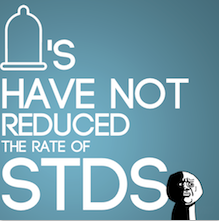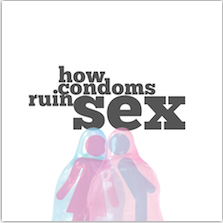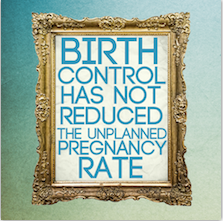
"We want sexy back," proclaims the website of grassroots youth organization 1Flesh. And how does one retrieve this sexy that we've supposedly lost over the course of the last generation? According to 1Flesh, through contraception-free, marital sex.
Founded by a group of college students headed by Catholic blogger Marc Barnes, 1Flesh (and its website full of Facebook-shareable graphics) decries what it describes as:
...sky-high rates of divorce, abortion, and STDs; a world bored with sex and bored with romance; a world in which more and more people are turning to pornography to find sexual satisfaction; a world in which 1 in 5 women report being sexual [sic] assaulted.
According to 1Flesh, the root cause of "all the wackness" is "the widespread use of artificial contraception," i.e. any form of birth control that isn't the rhythm method or "pulling out." So using condoms or taking the pill means contributing to a culture of sexual violence against women, sexual dissatisfaction and divorce? Hmm.... I'm with Jezebel's Katie Baker in supporting 1Flesh's desire for "women and men to be respected and loved for who they are, to the very depths of their being," but I also agree with her that that encouraging young people to forgo using contraception isn't the way to help them achieve said respect and love.
The graphics on the 1Flesh website are clearly trying to appeal to the social media-saturated generation. They use bright colors and pop art drawings to tell young people "how condoms ruin sex" (mostly because bros don't like to wrap it up), that "condoms have not reduced the rate of STDs" and that "birth control has not reduced the unplanned pregnancy rate" among other things.



Baker and Patheos blogger Claudia already did an excellent job of dismantling 1Flesh's claims, so I won't belabor the myth-busting. (Though, hint: Condoms do in fact reduce the risk of getting sexually transmitted infections and contraception does help prevent unplanned pregnancies.) But note also that this kind of fear-mongering becomes especially dangerous when you consider the audience being targeted -- young people who may or may not be informed enough to separate fact from fiction. This demographic might be better served by comprehensive sexual education that teaches them how to properly and effectively utilize available methods of contraception -- if and when they decide to engage in sexual activity.
In addition promoting health-related misinformation, 1Flesh asserts that using contraception of any kind -- not just condoms -- makes for a worse sex life. The group claims this is especially true for women:
For almost fifty years, American men and women have relied on artificial contraception for liberated, satisfied sex lives, free from fear and unwanted consequence. And by and large, artificial contraception has provided...for men. Women, on the other hand, are far more dissatisfied with their sex lives.
I'd like to call bullsh*t on this one, just based on anecdotal evidence. I know a whole lot of people who enjoy satisfying, sex lives -- both in and out of marriage -- while using birth control, but I decided to dig a little deeper as well.
The LiveScience article that 1Flesh links to does assert that women are more willing than men to settle for "mediocre" sex than men are. However, it makes absolutely no mention of contraception. Instead, the story lists other reasons that women might be dissatisfied with their sex lives: their busy schedules, poor body image, a fear of communication and a lack of emotional connection with their partners. 1Flesh also mentions a June 2010 German study which found a correlation between hormonal contraception and decreased interest in sex. But correlation doesn't necessarily mean causation, and a November 2010 study found that this link may have more to do with who takes oral contraception long-term (i.e. people in lengthy, monogamous relationships) than any physical effects of the pill.
I'm all for women educating themselves about the potential side effects of any medication before putting it into their bodies, and birth control pills are certainly no exception. If people want to wait to have sex until they're married, more power to them. But distorting statistics, telling people that they'll only enjoy sex within marriage, sans contraception, and encouraging everyone to stop using condoms to prevent unwanted pregnancies and STIs? Now that's "wackness."
